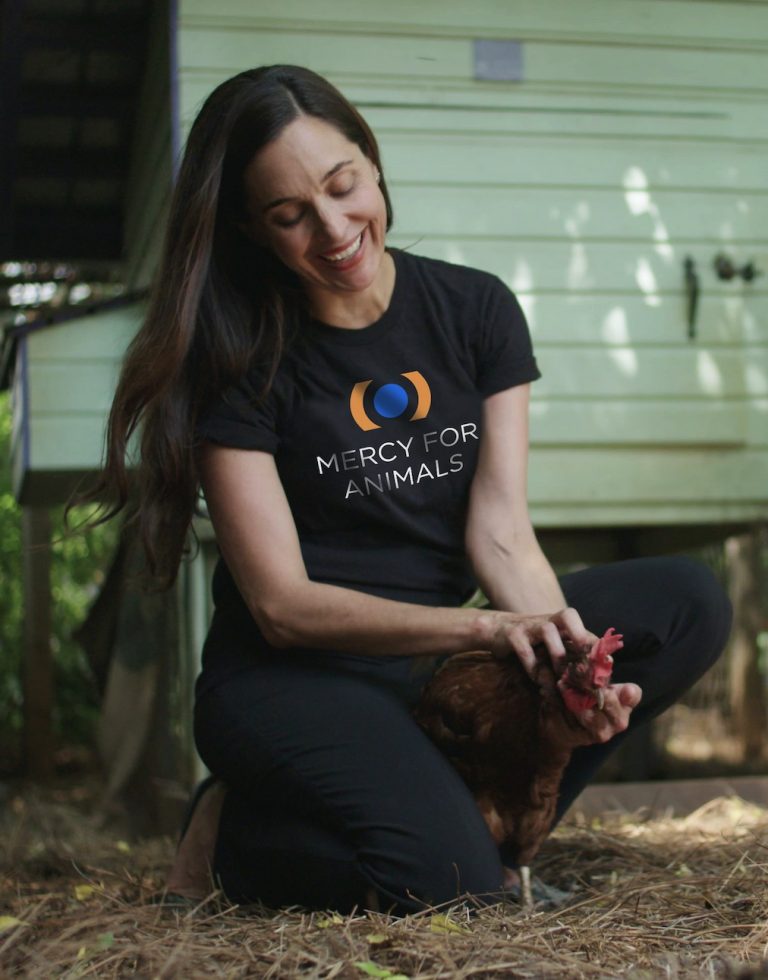Growing up in the swamps of Florida, the first female Latinx president of Mercy for Animals remembers her backyard always filled with wild ducks. “They’d lay their eggs in my mom’s prized flower beds,” she recalls. “I’d lie on my belly on our screened-in porch and watch the ducks hatch, watch their lives unfold. I grew up with no doubt in my mind that these ducks, and all animals, are full of complex emotions, wants, and needs.” In her adult life, she’s partnered with some of the largest food companies in the world with a mission to end factory farming. It all took off when she was fifteen.
Seeing a documentary about the way animals are raised for food was a turning point. “I was so upset, both by the suffering and being unknowingly complacent in the abuse.” She became vegetarian, then vegan, and decided to protect animals and nature as a career. Leah’s first steps were in the direction of becoming a wildlife vet, and things started clicking when her mentor pointed Leah to the impact of agriculture on wildlife, especially how runoff from farms was altering alligators’ biological sex characteristics and lowering their population. She then read the classic Silent Spring by Rachel Carson, “which awakened the activist in me.”
At the end of my degree, my mentor took me aside and said, 'Leah, you don’t want to be a vet. Vets are like plumbers – they fix animals once they are already broken. You want to get to the root of the problem.
She then went to London, one of the few places with masters degrees in Environment and Development in the late 90s, where she discovered a huge professional movement dedicated to protecting the welfare of animals. “I knew I had found my home.” Straight after her masters, she joined a farmed animal welfare organization and never looked back. “I’ve been working to protect animals, specifically farmed animals, ever since.” Her overall mission is to reduce suffering in the world. She has seen that our greatest opportunity to do so is through eliminating factory farming, as it oppresses billions of beautiful animal beings, as well as humans, and destroys our planet. “I strive to end that, and build a more just and compassionate food system.”

In the summer of 2014, she found herself sitting across from a man who was, by every definition, her enemy. His name was Craig Watts, a factory farmer who was raising chickens for slaughter. The day they met, Craig had been raising chickens for 22 years in factory farms for Perdue, the fourth-largest chicken company in the United States. When Craig was a young adult, he searched for a way to stay on the land that had been passed down in his family for five generations in one of the poorest counties in North Carolina. There were very few jobs, so when Perdue came to town and offered him a contract to raise chickens, it sounded like a dream come true. He took out a $250,000 loan from the bank to build the chicken houses. Perdue paid him for each flock he raised. With that money, he was paying off the loan.
But soon, the chickens started to get sick. When the chickens got sick, they died, and you don’t get paid for dead chickens. Craig started to struggle to pay off his loan. Soon, he realized he’d made a mistake – he wanted out. By the time he and Leah met, he’d reached a breaking point.
Over the next few months, she and a filmmaker would come back regularly to learn from Craig and document the conditions on his farm. “The New York Times released the story, and in 24 hours, a million people had seen our video about the horrors of chicken factory farming. Our story went viral. Suddenly, we had a megaphone – our unlikely alliance put the truth of factory farming on a global platform.” This led Leah to found the Transfarmation Project at Mercy For Animals, where they help transition farmers from industrial animal agriculture to alternative livelihoods such as growing mushrooms and microgreens. “Still, 99% of our meat, eggs, and dairy come from farmers who are under the thumb of a big corporation.” They want to show them that there are options – just this year, Leah and the team are starting two Transfarmation Hubs that will demonstrate exactly how someone can get out of industrial animal agriculture.
Personally, she is a person of deep habits. Sometimes life gets hectic with three kids, travel, and her job. When people ask her how she does it all, she likes to answer that not necessarily well, but that she just keeps showing up consistently, even when she doesn’t feel like it. It might seem rigid, but routines have anchored her throughout life, even when times were tough. For instance, she relaxes on weekends and takes her downtime seriously: “Some of my best ideas and most focused work comes after a period of rest and removal from work. If we want to last as activists for animals, we have to take care of ourselves.”
I love a baked sweet potato with Violife feta, marinated tofu, and kale. I honestly eat it almost every day for lunch when I’m not traveling!
“…seeing farmed animals in sanctuaries living out their best lives.”
” I’d live with two dogs, have an open-air Jeep, and ride through the wilderness of Wyoming as a forest ranger!“
“…My grandmother. She was the epitome of strength and integrity. She left Colombia on her own with five kids seeking out a better life in the United States. She loved to travel, was incredibly smart, and deeply spiritual. She taught me to never, as a woman, be afraid to go after the things you really want in life.”